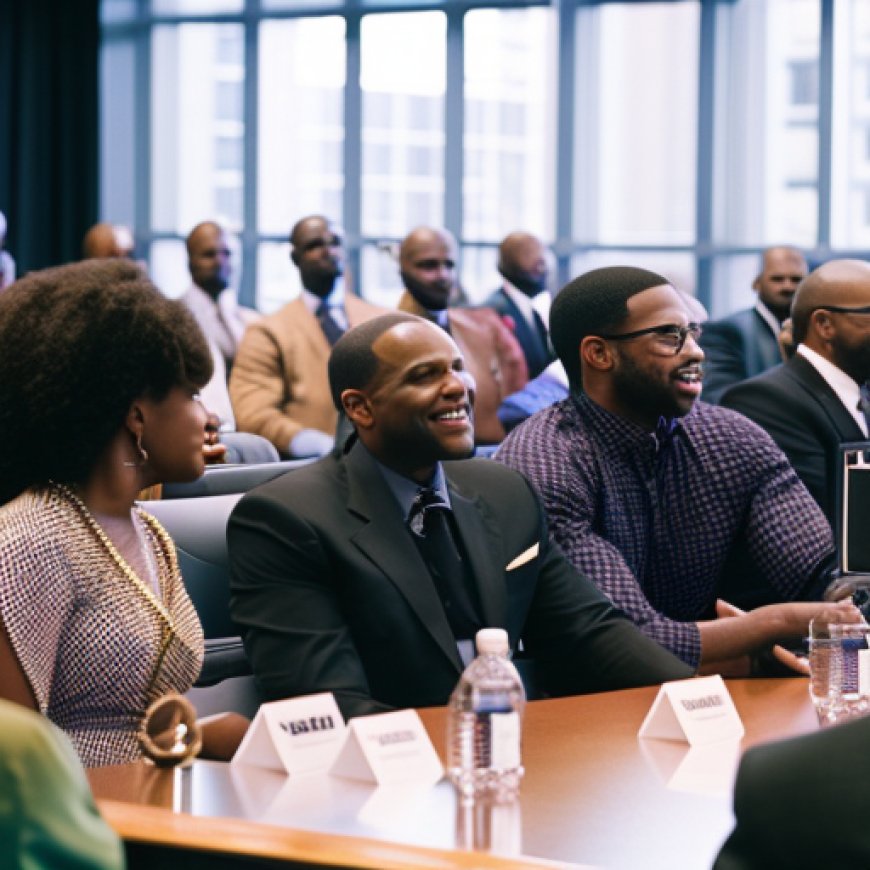UNCF’s Center for Innovation and Entrepreneurship Hosts Pitching Competition for HBCU Student Entrepreneurs – UNCF


More than $32,000 in venture capital awarded
Empowering and equipping the next generation of Black entrepreneurs is the mission of UNCF’s (United Negro College Fund) Center for Innovation and Entrepreneurship (CIE). That was the driving force behind the center’s recent Innovate for Impact Pitch Competition in partnership with Think Broccoli, a creative agency focusing on brands. The competition resulted in $32,500 in funding to support the ventures of three student entrepreneurs from historically Black colleges and universities (HBCUs). The awards were presented before a live audience at The Gathering Spot in Washington, DC.
Competition Winners
- Raina Ford from Howard University – Grand prize of $15,000 for Project I See U, LLC, a multimedia and retail products social entrepreneurship company.
- Folaranmi Olawepo from North Carolina A&T State University – Second place and $10,000 for his app Neur to support student entrepreneurs.
- Sydney Jael-Wilson from Spelman College – Third place and $7,500 for a social justice-oriented mobile bookstore, Books from The Ashes.
“These young leaders are tackling real issues, from supporting families facing health challenges to promoting social justice through literacy. They embody the change we want to see in the world,” said Devon Cobin, director, center for innovation and entrepreneurship, UNCF.
Raina was elated as the top winner of the competition. “My time as an Innovate for Impact Pitch Competition participant was a transformative experience not only professionally but personally. I was able to meet fellow HBCU entrepreneurs, mentors and future investors,” Raina said. “I am grateful for the opportunity to share my vision and receive capital for my business, Project I See U. Thank you UNCF and Broccoli City Fest for the opportunity to gain a vast network of business professionals who are truly invested in my growth and success.”
Competition Overview
- The competition began with a pool of 360 students who submitted their ventures within a week and a half.
- The 360 ventures were reduced to 65 from 27 HBCUs.
- Twenty-four were selected for mentorship and ultimately eight were selected to compete in the final round of the competition.
About UNCF
UNCF (United Negro College Fund) is the nation’s largest and most effective minority education organization. To serve youth, the community and the nation, UNCF supports students’ education and development through scholarships and other programs, supports and strengthens its 37 member colleges and universities, and advocates for the importance of minority education and college readiness. While totaling only 3% of all colleges and universities, UNCF institutions and other historically Black colleges and universities are highly effective, awarding 15% of bachelor’s degrees, 5% of master’s degrees, 10% of doctoral degrees and 19% of all STEM degrees earned by Black students in higher education. UNCF administers more than 400 programs, including scholarship, internship and fellowship, mentoring, summer enrichment, and curriculum and faculty development programs. Today, UNCF supports more than 50,000 students at over 1,100 colleges and universities across the country. Its logo features the UNCF torch of leadership in education and its widely recognized trademark, ‟A mind is a terrible thing to waste.”® Learn more at UNCF.org or for continuous updates and news, follow UNCF on X (formerly Twitter) at @UNCF.
SDGs, Targets, and Indicators in the Article
1. Which SDGs are addressed or connected to the issues highlighted in the article?
- SDG 4: Quality Education
- SDG 8: Decent Work and Economic Growth
- SDG 10: Reduced Inequalities
- SDG 17: Partnerships for the Goals
2. What specific targets under those SDGs can be identified based on the article’s content?
- SDG 4.4: By 2030, substantially increase the number of youth and adults who have relevant skills, including technical and vocational skills, for employment, decent jobs, and entrepreneurship.
- SDG 8.3: Promote development-oriented policies that support productive activities, decent job creation, entrepreneurship, creativity, and innovation, and encourage the formalization and growth of micro-, small-, and medium-sized enterprises.
- SDG 10.2: By 2030, empower and promote the social, economic, and political inclusion of all, irrespective of age, sex, disability, race, ethnicity, origin, religion, or economic or other status.
- SDG 17.17: Encourage and promote effective public, public-private, and civil society partnerships, building on the experience and resourcing strategies of partnerships.
3. Are there any indicators mentioned or implied in the article that can be used to measure progress towards the identified targets?
- Number of youth and adults with relevant skills for employment, decent jobs, and entrepreneurship.
- Number of productive activities, decent jobs, entrepreneurship opportunities, and innovation initiatives supported.
- Extent of social, economic, and political inclusion of individuals from diverse backgrounds.
- Number of effective partnerships established between organizations and institutions.
Table: SDGs, Targets, and Indicators
| SDGs | Targets | Indicators |
|---|---|---|
| SDG 4: Quality Education | 4.4: By 2030, substantially increase the number of youth and adults who have relevant skills, including technical and vocational skills, for employment, decent jobs, and entrepreneurship. | Number of youth and adults with relevant skills for employment, decent jobs, and entrepreneurship. |
| SDG 8: Decent Work and Economic Growth | 8.3: Promote development-oriented policies that support productive activities, decent job creation, entrepreneurship, creativity, and innovation, and encourage the formalization and growth of micro-, small-, and medium-sized enterprises. | Number of productive activities, decent jobs, entrepreneurship opportunities, and innovation initiatives supported. |
| SDG 10: Reduced Inequalities | 10.2: By 2030, empower and promote the social, economic, and political inclusion of all, irrespective of age, sex, disability, race, ethnicity, origin, religion, or economic or other status. | Extent of social, economic, and political inclusion of individuals from diverse backgrounds. |
| SDG 17: Partnerships for the Goals | 17.17: Encourage and promote effective public, public-private, and civil society partnerships, building on the experience and resourcing strategies of partnerships. | Number of effective partnerships established between organizations and institutions. |
Source: uncf.org








